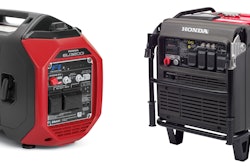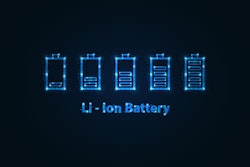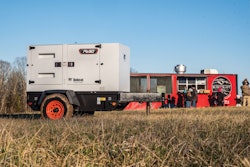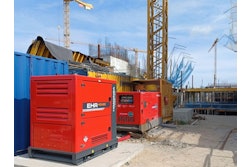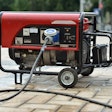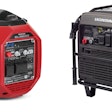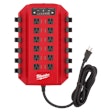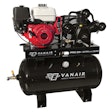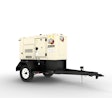
Athan Tsokolas, product manager at Vanguard Commercial Lithium-Ion Batteries, shares his insight into the electric portion of equipment rental.
Rental connected with Tsokolas over email in May 2025.
Q. Have equipment rental companies found more customers requesting more battery/electric options? Why?
 Athan TsokolasVanguard Commercial Lithium-Ion Batteries
Athan TsokolasVanguard Commercial Lithium-Ion Batteries
An important driver is the evolving regulatory landscape. We're witnessing a strong push towards electrification not only to reduce emissions but also, increasingly, to tackle noise pollution. Many municipalities, particularly larger urban centers and homeowner associations, are adopting stricter noise ordinances. These rules often limit when louder, traditional gas-powered equipment can be used. Battery-powered equipment offers a crucial advantage here, providing the quieter operation needed to comply and ensure crews can maintain their work schedules.
Alongside regulatory drivers, confidence in battery technology itself is on the rise. In the past, concerns about runtime and range anxiety were considerable barriers. However, continuous advancements in battery life, charging, performance, and durability are steadily building trust among rental customers. As this confidence matures so does the adoption of electric options. At Vanguard, we're working closely with our rental partners to ensure they can confidently integrate electric equipment into their fleets.
Rental companies are also realizing the substantial operational benefits that smart lithium-ion batteries deliver. For example, all Vanguard lithium-ion batteries are equipped with an integrated Battery Management System (BMS). This intelligent feature allows the batteries to share extensive data and unlock previously inaccessible insights. Rental businesses can use this information to:
- Simplify the integration and tracking of equipment thanks to the onboard smart technology.
- Better understand customer utilization patterns, which aids in optimizing their fleet.
- Enable a proactive and preventative maintenance strategy through remote diagnostic checks, allowing for issues to be addressed before they cause disruptions.
- Improve the tracking and security of their fleet assets.
We’re also committed to developing innovative solutions tailored to the practical demands of the rental sector. Our 48V 1.5kWh* Commercial Battery (Si1.5) with its swappable interface is a testament to this. It provides a standardized power solution that is adaptable across various equipment types. For rental companies, this translates to reduced maintenance, greater ease of use for their customers and a reusable power source. All of this helps contribute to a lower total cost of ownership (TCO).
The rental industry is undoubtedly more dynamic than it used to be, especially concerning new technologies and regulations. As a forward-thinking power solutions partner, Vanguard leverages its extensive industry experience to help rental companies navigate the evolving electrification landscape and select solutions that meet both their business needs and those of their customers. We anticipate this demand for battery-electric options will only continue to strengthen.
Q. What are the differences between a rental agreement for a fuel-based asset vs electric?
When we look at rental agreements for fuel-based versus electric assets, the core structure of the agreement might remain similar. The specifics within various clauses, however, will likely need to adapt to the distinct characteristics and operational aspects of battery-powered equipment.
The initial consideration, as always, is matching the equipment to the application and power needs. While some heavy-load, long-duration tasks may still be best served by engine power, battery technology is advancing rapidly. This means more applications, especially in the compact equipment space, can benefit from fully electric solutions. A rental agreement for an electric machine might, therefore, include more specific details regarding its suitability for the intended task, particularly concerning runtime expectations and charging capabilities for the job at hand.
A key area of difference will revolve around operational responsibilities and new application potentials. For instance, electric equipment's ability to be used indoors, even after walls and a roof are in place, opens up new uses for contractors. Rental agreements may need to specify guidelines for such indoor use. This ability to tap into newer and broader markets could also be a factor in how agreements are structured or what services are bundled.
Maintenance requirements are also different. Electric equipment typically offers the benefit of lower maintenance. However, the rental agreement will need to address charging: who is responsible for charging, the state of charge expected upon return, and guidelines for proper battery care during the rental period. While the industry is still navigating broader infrastructure considerations for charging, these aspects would be important in an agreement between the rental house and the end-user.
The availability of additional data from smart battery systems, like those on Vanguard batteries, is another emerging area. This data can lead to smarter, more connected equipment, enabling users to optimize their work and help extend machine life through diagnostics. Rental agreements might start to incorporate clauses related to data access, usage for diagnostic, or how this connectivity is managed during the rental term.
Finally, while factors like upfront costs versus total cost of ownership (TCO) are primarily considerations for the rental company's investment strategy, the cost savings from low maintenance and improved efficiency with electric assets can be a significant selling point. These units offer excellent reliability. This dependable performance, backed by robust warranties like Vanguard's recently extended eight-year commercial limited warranty on our lithium-ion battery lineup, gives rental houses the confidence to invest in and offer these machines. This confidence can lead to clearer and more straightforward terms for renters, focusing on the benefits and proper use of advanced electric equipment.
As OEMs and rental houses increasingly integrate battery power due to evolving regulations and customer demand, rental agreements will naturally evolve to reflect the unique advantages and operational parameters of these technologies.
Q. If their customers are most comfortable with fuel, what are some tactics / talking points equipment rental companies can use when discussing an electric option with customers?
When working with a customer that is more used to fuel-based equipment, it helps to acknowledge their positive experiences with engines. From there ask them about the specifics of the project at hand — what is their work environment, duration and power demands? Conversations like these offer an opportunity to educate customers on the scenarios where battery power does make sense.
With these ongoing advancements in mind, you can then point to the tangible benefits electric equipment provides:
- New Job Opportunities: Electric power allows work in previously restricted areas, such as indoors due to zero operating emissions, potentially opening up new markets for them.
- Reduced Hassle & Greater Uptime: Customers will appreciate significantly less daily maintenance. Many contemporary commercial batteries are designed for extensive lifespans with minimal upkeep. This means more reliable power and less interruption on their jobsite.
- Efficient & Smart Operation: Electric systems often deliver consistent power and can include smart features that provide data to help optimize their work.
Beyond these advantages, it’s also crucial to address common concerns such as range anxiety and charging. You can reassure customers by explaining how today's battery technology offers effective solutions:
- Longer Runtimes & Faster Charging: Advancements are leading to batteries with greater energy density for longer operation. Plus, the industry is seeing faster charging solutions that cut down potential downtime.
- Smarter Power Management: Discuss how innovations like improved battery management systems enhance efficiency. Modular or even swappable battery designs like the Si1.5 battery from Vanguard are simplifying on-site power management and ensuring continuous operation.
Help your customers determine the best fit for their specific use case. Whether it's traditional fuel power or an advanced electric unit, you can help them choose what will make their project more efficient and cost-effective.
Q. What are the latest changes for your company?
At Vanguard, we've been focused on several key advancements to better serve our OEM customers, end-users, and particularly the rental market. One of the most significant recent updates is that all Vanguard battery packs are now backed by a leading eight-year commercial limited warranty. This move underscores the immense confidence we have in the durability and performance of our batteries and our commitment to providing long-term value and support.
Finally, a constant and crucial area of focus for us is deepening our collaboration with OEMs to drive greater standardization across equipment segments. We are actively working with these partners to expand the range of equipment compatible with our battery systems. This is especially true of versatile solutions like our Si1.5 swappable battery which can serve as a universal power source across many different applications and be scaled for various power needs. This collaborative approach to standardization is critical for rental companies. It helps provide more equipment options, allows them to better leverage their battery investments, ensures consistent offerings across locations, and simplifies charging infrastructure and service network development.
Q. What can we expect on the horizon?
Looking ahead, Vanguard is dedicated to pushing the boundaries of electrification technology and support. You can expect continued innovation aimed at enhancing the reliability and performance of our battery systems. For instance, we are:
- Actively developing unique charging solutions to offer greater convenience and efficiency for operations managing multiple batteries.
- Working on enabling batteries like our Si1.5 to be used in parallel with other Vanguard Si1.5 batteries. This will significantly expand application potential, providing customers with even better runtime and performance for more demanding tasks.
We understand the challenges the industry faces with electrification, including range anxiety and charging infrastructure. Our innovations are designed to address these head-on. We are excited about the future and are committed to remaining at the forefront of this evolving technology, working closely with our rental partners and OEMs to bring these advanced, complete power solutions to the market effectively.
Q. Any final thoughts for rental companies?
My final thought for rental companies is to fully embrace the opportunities that electrification and evolving power technologies present. This is a chance to meet evolving customer preferences for advanced, efficient power, enhance fleet versatility, and potentially tap into new revenue streams. Vanguard is deeply committed to being a strong partner in this journey, providing innovative and reliable power solutions, like our expanding battery and electric powertrain offerings, and the dedicated support needed to help your rental business thrive in this exciting, evolving landscape. We're here to help you succeed.


